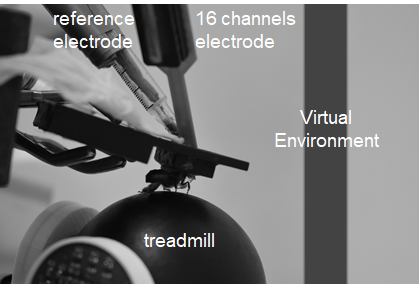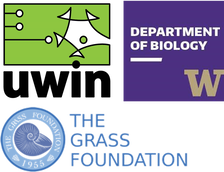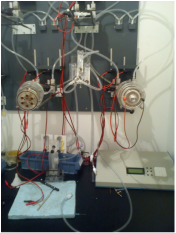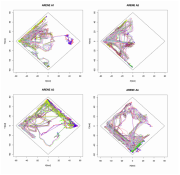
PhD RESEARCH
High-order processing in a miniature brain - Visual learning and processing in the honeybee brain
Ph.D project, RIFFELL LAB
The honeybee, Apis mellifera, possesses a miniature brain (approximately one million of neurons) but exhibits incredibly sophisticated behavior. For instance, a forager honeybee can learn abstract concepts such as sameness/difference or above/below, to recognize specific human faces and even count. The neural basis of those behaviors have yet to be elucidated due to the difficulty in linking free-flying behaviors with tethered preparations typically used in in vivo neurophysiological recordings. During my PhD, I developed a Virtual Reality Environment (VR) and showed that tethered walking honeybees in our VR could learn to discriminate between visual stimuli. Then, we combined behavioral and neural recordings to explore how internal state and sensorimotor feedback impacted neural activity in the medulla, the second optic lobe of the honeybee. Overall, around a third of the neural population recorded was influenced by behavioral control (i.e., if the honeybee had control or not of the visual scene motion). Moreover, honeybees exhibited a surprisingly high ability to adapt to multiple levels of motor gain. In summary, this work provided support to the growing idea that internal and behavioral state are essential for studying how the brain produces behavior.
Advisor:
Prof. Jeffrey A. Riffell (Riffell Lab, UW, USA)
Committee:
Prof. Bing Brunton
Prof. Thomas Daniel
Prof. David Gire
Prof. Nathan Kutz
Prof. David Perkel
Collaborators:
Prof. Clément Vinauger (Vinauger Lab, VA, USA)
Prof. Eatai Roth (Roth Lab, IN, USA)
Diego Alonso San Alberto (Riffell lab, UW, USA)
Fundings obtained during my Ph.D:
High-order processing in a miniature brain - Visual learning and processing in the honeybee brain
Ph.D project, RIFFELL LAB
The honeybee, Apis mellifera, possesses a miniature brain (approximately one million of neurons) but exhibits incredibly sophisticated behavior. For instance, a forager honeybee can learn abstract concepts such as sameness/difference or above/below, to recognize specific human faces and even count. The neural basis of those behaviors have yet to be elucidated due to the difficulty in linking free-flying behaviors with tethered preparations typically used in in vivo neurophysiological recordings. During my PhD, I developed a Virtual Reality Environment (VR) and showed that tethered walking honeybees in our VR could learn to discriminate between visual stimuli. Then, we combined behavioral and neural recordings to explore how internal state and sensorimotor feedback impacted neural activity in the medulla, the second optic lobe of the honeybee. Overall, around a third of the neural population recorded was influenced by behavioral control (i.e., if the honeybee had control or not of the visual scene motion). Moreover, honeybees exhibited a surprisingly high ability to adapt to multiple levels of motor gain. In summary, this work provided support to the growing idea that internal and behavioral state are essential for studying how the brain produces behavior.
Advisor:
Prof. Jeffrey A. Riffell (Riffell Lab, UW, USA)
Committee:
Prof. Bing Brunton
Prof. Thomas Daniel
Prof. David Gire
Prof. Nathan Kutz
Prof. David Perkel
Collaborators:
Prof. Clément Vinauger (Vinauger Lab, VA, USA)
Prof. Eatai Roth (Roth Lab, IN, USA)
Diego Alonso San Alberto (Riffell lab, UW, USA)
Fundings obtained during my Ph.D:

-2020: Hall International Fellowship, Department of Biology
-2019: Robin Mariko Harrid Graduate Fellowship in Insect Studies and Lynn Riddiford and James Truman Endowed Fellowship, Department of Biology
-2016-2018: University of Washington Institute of Neuroengineering Fellowship
-2017, 2018: Robin Mariko Harris research award, Department of Biology
-2018: Grass Foundation -Neural System and Behavior Course (Marine Biology Laboratory, Woods Hole, USA)
- 2018: NIH Grant: Scholarship funds as financial support for the course Neural System and Behavior (Marine Biology Laboratory, Woods Hole, USA)
-2019: Robin Mariko Harrid Graduate Fellowship in Insect Studies and Lynn Riddiford and James Truman Endowed Fellowship, Department of Biology
-2016-2018: University of Washington Institute of Neuroengineering Fellowship
-2017, 2018: Robin Mariko Harris research award, Department of Biology
-2018: Grass Foundation -Neural System and Behavior Course (Marine Biology Laboratory, Woods Hole, USA)
- 2018: NIH Grant: Scholarship funds as financial support for the course Neural System and Behavior (Marine Biology Laboratory, Woods Hole, USA)

PAST RESEARCH
Drosophila is a well-established model for the study of learning and memory. Using an olfactory aversive learning paradigm, earlier work has demonstrated that the performance of conditioned individuals was improved in presence of trained, but not naïve, flies.
For my Master Thesis, I was interested in understanding better the mechanisms and modalities of this facilitation using pharmacological and genetic tools.
Under the supervision of Dr. Guillaume Isabel (TEAM EXPLAIN) and Dr. Raphaël Jeanson (TEAM VIP) in the Research Centre on Animal Cognition (UPS, Toulouse, France)
- Social facilitation of memory retrieval in the fruit fly, Drosophila melanogaster
Drosophila is a well-established model for the study of learning and memory. Using an olfactory aversive learning paradigm, earlier work has demonstrated that the performance of conditioned individuals was improved in presence of trained, but not naïve, flies.
For my Master Thesis, I was interested in understanding better the mechanisms and modalities of this facilitation using pharmacological and genetic tools.
Under the supervision of Dr. Guillaume Isabel (TEAM EXPLAIN) and Dr. Raphaël Jeanson (TEAM VIP) in the Research Centre on Animal Cognition (UPS, Toulouse, France)

- Collective motion in sheep, Ovis aries
For this undergraduate project, I participate to the analysis of collective motion in groups of sheep. Broadly, this project intended to study whether behavioral and physiological plasticity is equally shared in sheep as a function of group size, i.e. to what extent individuals change their behavioral pattern through allelomimetic behavior.
Under the supervision of Dr. Richard Bon (TEAM CAB ) in the Research Centre on Animal Cognition (UPS, Toulouse, France)
